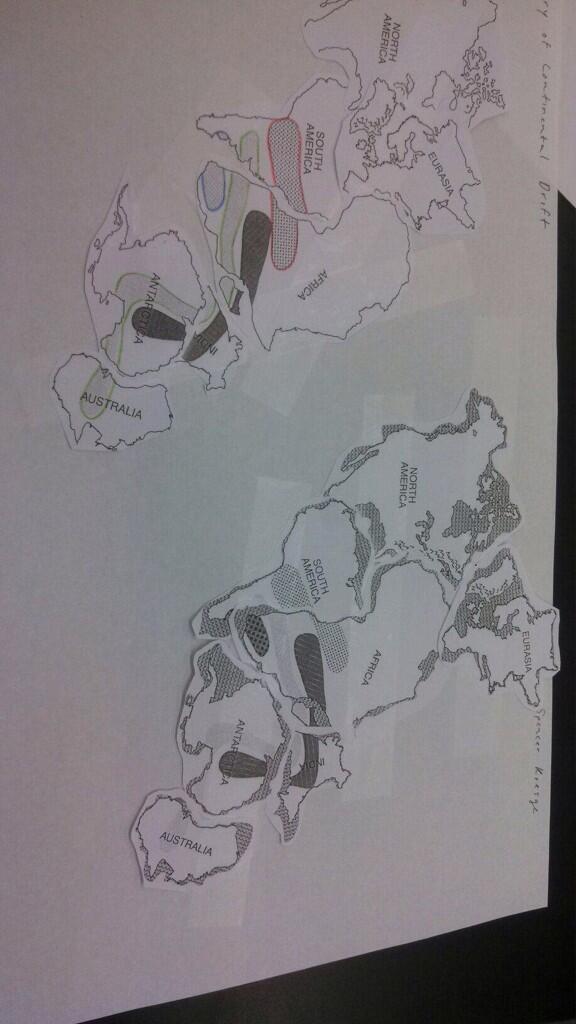Friday, November 1, 2013
Sand Reflection
This week we examined eight different sediments each from different places in the world. A lot of the sediments had many similar characteristics like look, shape, composition, etc. The Maui sand was one of the three sediments that were actually a magnetite. The other to that were magnetite sediments were the sand from Desert Island, and Plum Island. Two sediments that are a lot alike was the sand from Maui and Desert Island. They are both around the same size,color, magnetite, texture, and composition. Both the sediments traveled a far distance considering Maui is in Hawaii, and Desert Island is in Luisiana.
Friday, October 18, 2013
Dance of the Continents
This week we learned about the theory of plate tectonics, seafloor spreading, and continental drift and how they shape the world we live in today. This is not the first time I have went over this subject but it is the first time that I learned so much about it.

I always thought that the plates only moved back and forth, now I know that they do a lot more like creating giant valleys at the bottom of the seafloor. I can see why some these theories are not exactly solid, mainly because it would be so hard for scientists now o go down to where the plates meet and get research because of the technology we do not have yet.

Friday, October 4, 2013
Experiment
To observe and research the breeding habits of the clam, there is lot to take into consideration. Since the depth is so deep a submersible will be needed so that it is safe and research can be collected. It will be very dark so a high powered light would be needed. Since the boat ride takes seven days there has to be a sufficient amount of food and water for a fourteen day round trip.
Friday, September 20, 2013
Underwater Research Station
Living underwater is not easy mostly because of the time and preparation that goes into to building an underwater research station and the considerations that have to be accounted for. It is very tricky building an underwater research station because this observatory has to be built so that basically no problems can occur, it is able to withstand the effects of the ocean floor, and is able to allow the researches to gather information as easily as possible.
Building an underwater research station means that when building it all the researchers consideration and accommodations need to be fulfilled so that they are able survive and gather research. The researchers need needs for basic living like a good air supply, food supply, and emergency plans if needed. The worlds largest observatory The sensors will be monitoring pressure, oxygen levels, deep sea currents, seismic activity, underwater audio, and more.
Friday, September 13, 2013
Why Explore the Oceans
The Earth has one big ocean with many features that I have probably learned more about in the past week than I have in a long time. We talked about the explorers and civilizations from many years ago and about how they depended on sea exploration to maintain and grow their knowledge on what the ocean is and what it holds. Every civilization explored for the about all the same reason, which was to find food resources, find land, and find trade routes. Sea exploration does not just date back to Columbus and the other explorers around his time but it goes back to the ancient civilizations like the Phoenicians, Polynesians, Chinese, and the Vikings to name a few.
We all were given an explorer, civilization, or person that invented something to change how we explore the ocean. I was given Ptolemy a man during the Roman Empire, in Egypt who changed the old latitude, longitude system into the same one we use today. The others in my class presented people like Magellan, Columbus, the Chinese, and many more. They told us things I never exactly knew before, like that nobody thought the world was flat, the Chinese were far more advanced than any civilization and they invented the compass. All of these people helped expand the world.
We all were given an explorer, civilization, or person that invented something to change how we explore the ocean. I was given Ptolemy a man during the Roman Empire, in Egypt who changed the old latitude, longitude system into the same one we use today. The others in my class presented people like Magellan, Columbus, the Chinese, and many more. They told us things I never exactly knew before, like that nobody thought the world was flat, the Chinese were far more advanced than any civilization and they invented the compass. All of these people helped expand the world.
Subscribe to:
Comments (Atom)